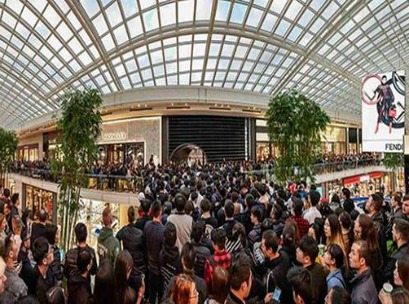 Luxury Retail Group CEO Nelson Mair is gearing up for his next luxe brand launch into the local market next year, amid firming local demand for global up-market brands.
Luxury Retail Group CEO Nelson Mair is gearing up for his next luxe brand launch into the local market next year, amid firming local demand for global up-market brands.
LRG, which owns Sneakerboy and has local expansion deals for Balenciaga and Folli Follie, remains bullish on the local market after successfully launching Furla here, selling the brand’s local distribution rights back to its parent earlier this year.
Mair wouldn’t reveal which brand is next on LRG’s radar, but he and business partner, Harrold’s co-founder Theo Poulakis, will look to place the venture within Chadstone’s new luxury precinct, which now hosts a brand new Sneakerboy location.
“We’ve got another brand we’ll bring into the market next year,” Mair told IRW, adding that he expects the designer end of the market to start gaining ground on fast fashion in the coming years.
“We’re seeing a little bit of a return to core value propositions. Having beautifully made products is becoming a bit more relevant in the market…we feel that over the next three to five years, we’ll see a little bit of a swing back to something with more integrity and prominence.”
Sneakerboy seizes the moment
Mair’s next bet will come amid intensifying local investment from global luxury brands as traditional stockists such as David Jones and Oroton Group struggle to maintain momentum in the market.
He is confident LRG will emerge on top, while also expanding the position of its other core brands in the market through a strict on-demand ranging strategy.
Sneakerboy is basing its expansion on precisely that principle. Mair and brand founder and creative director Chris Kyvetos have just unveiled a new concept for the brand at Chadstone, designed to open the luxury model up to a broader market segment.
A quarter of the new multi-million-dollar concept has been devoted to a “sneaker exchange”, an area within the store where consumers can sell sneakers to other shoppers, expanding the brand’s model to include in-store transactions, albeit not made by the company.
The store is already doing a roaring trade, with 15,000 customers coming through the doors each week – a premium on Mair’s original estimate of 8,000-10,000, and sales are up. The Sneakerboy physical store acts in a similar fashion to a showroom, where people are encouraged to try on shoes, but instead of buying them in-store, the products are shipped to customers at home.
“The great thing is the diversity of the foot traffic. That was one of the things we were looking to create,” Mair said. “One of the things that we’re working on with brands like Nike and Adidas is to get the latest and greatest products that are a bit more available so we can look after more customers.”
The new venture has underpinned confidence in an expansion of the model into Sneakerboy’s Collins Street store in Melbourne, which is being assessed for possible floorspace expansion.
Re-commerce is becoming increasingly popular among consumers in luxury categories, with second-hand accessories businesses such as luxe.it.fwd. emerging in the Australian market in recent years, but Mair reckons sneakers are leading the way, with re-sells growing at 25 times the pace of retail growth.
“The growth track [of re-commerce] shows it’s a trend for consumers to trade amongst themselves, so we’re going there to basically be a leader in our category,” Mair said.
This story first appeared in last week’s edition of Inside Retail Weekly.
Access exclusive analysis, locked news and reports with Inside Retail Weekly. Subscribe today and get our premium print publication delivered to your door every week.





